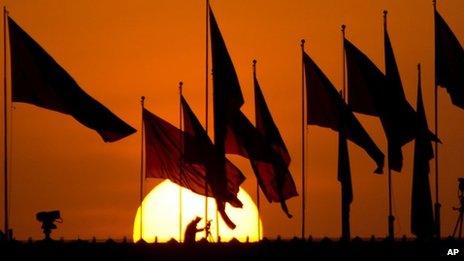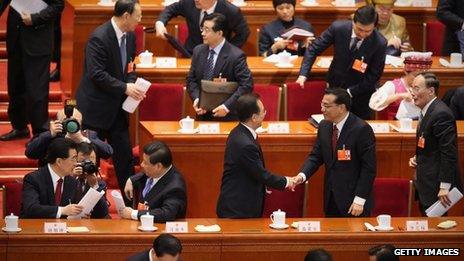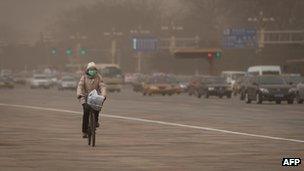What does the future hold for China?
- Published
- comments

People want to know how Xi Jinping will govern an increasingly complex China
China's moment of change has come. After a decade in power, President Hu Jintao and Premier Wen Jiabao are stepping aside. Xi Jinping and a new generation are taking over.
Already elevated to the post of general secretary of the Communist Party last November, Xi Jinping will be confirmed as China's new head of state by the National People's Congress now meeting in Beijing.
So, naturally, the question everyone is asking is, what does the future hold for China? How will Xi Jinping govern this huge, complex and increasingly powerful nation?
Flat atmosphere
Seen from the outside, China is envied by many, praised as the economic success story of the past decade.
As developed nations have stumbled, China's rise has seemed unstoppable. You'd think this would be a moment of celebration for China's leaders, old and new.
But as Premier Wen delivered his final major address to the Congress, the atmosphere was curiously flat.
He listed many successes - half his speech, 14 pages, was devoted to them. There was little sense that he was bowing out on a high though.
In the past five years, Mr Wen said, 30 million homes have been constructed or renovated, 18,000 reservoirs reinforced, 19,700km (12,200 miles) of railway and 609,000km of roads built - the lists went on and on.
Many times Mr Wen hailed "impressive achievements" and lauded his government's efforts, saying "we always strove" to do X, "we vigorously promoted" Y. The applause from the Congress, though, was muted.
Listening, Xi Jinping sat betraying little emotion. The reason may well be that both Mr Xi and the Congress seem to be preoccupied not by past achievements but future problems.
Few easy answers
Wen Jiabao listed many of those problems - economic growth that's slowing, unsustainable and unbalanced, social services, pensions and healthcare that need investment, issues of corruption, serious pollution of China's air, soil and water, and food safety scares.
So for China's Communist Party, this leadership change is not so much a time of celebration as of introspection and anxiety.
The party is aware that in the eyes of many Chinese, its authority is eroding. And while the party leaders know the problems they face, they know too that there are few easy answers.
Wen Jiabao's speech was long on aspirations, short on announcements. Take pollution for example. China's leaders know it's an issue that ordinary people are increasingly angry about, but they have offered few solutions.
"We should adopt effective measures to prevent and control pollution," Wen Jiabao said, but he didn't enumerate what those measures might be.
There was no promise of a Clean Air Act or tough new powers for China's environmental authorities, just the promise to do better.

The Communist Party is aware that in the eyes of many, its authority is eroding
Mr Wen's reticence may be because he is about to step down. The new leadership may be waiting to announce new measures so they can take the credit for new policies.
But it may also be because many of China's problems are so tough to fix, particularly for a Communist Party that is, at heart, cautious and careful, concerned about making any missteps, about the unintended consequences of any changes it might make, and beholden to many of its own vested interests.
Leadership change
Take pollution again as an example. Reducing it will mean imposing new costs on industries that have to clean up their acts.
Some of those industries are state owned and are powerful political players. Others are private firms that live in a cut-throat, competitive world where costs matter.

There was no promise of a Clean Air Act in Mr Wen's speech
New regulations would mean imposing new costs and may lead them to cut the size of their workforce. So, if you're Xi Jinping, what's worse - having more unemployed workers to find jobs for, or dirtier air for people to breathe? It won't be easy being China's new leader.
Which takes us back to the question hanging over this Congress and its leadership change. What direction will Mr Xi take?
The best answer for now, it seems, was there in Wen Jiabao's speech.
"Development is still the key to solving all our problems," he said. "We must keep economic development as the central task and give it our undivided attention."
"Urbanisation is a historical task," added Mr Wen, saying, "we can continue to advance our cause only by adhering to reform and opening up."
That's a pretty clear indication that change under Xi Jinping will be modest and incremental. "Reform and opening" means China's current path, opening its economy, but not reforming its political system.
So China under Xi Jinping will continue to pursue rapid economic growth, it'll continue to build its giant cities, to shift tens of millions from the countryside to the towns.
The Communist Party will try to make itself cleaner, more efficient, more responsive to the needs and aspirations of China's people.
But the old formula, trying to deliver increasing prosperity but not relaxing political control, is the one Mr Xi and the Communist Party are keeping faith with for now.